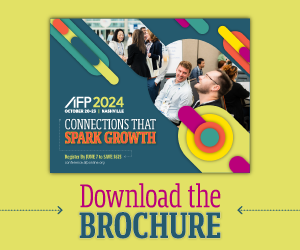Articles
Intentional Learning: Critical Mindsets for Career Advantages
- By Brooke Ballenger
- Published: 4/27/2021

Why are intentional learners at a higher career advantage than most in the professional world? It is because intentional learners are continually in an unconscious, reflexive mindset — one at which they operate at all times to improve their skills. Anyone can unlock intentionality in their lives by simply adjusting two critical mindsets: growth and curiosity.
In a webinar moderated by AFP President and CEO Jim Kaitz, “Intentional Learning and the Career Advantage,” two of McKinsey & Company’s learning experts, Matt Smith and Lisa Christensen, discuss the importance of these powerful mindsets and how to develop them.
Growth
Adopting a growth mindset suggests that you can grow, expand, evolve and change, and is fundamental for individuals who want to invest in learning. It releases you from the expectation of being perfect and allows you to find value in the process, regardless of the outcome.
According to Smith, the growth mindset is a concept that was developed several decades ago by an academic and psychologist named Carol Dweck. Dweck's work looked at the beliefs people had about their ability to learn and found that people tend to hold one of two beliefs about any given topic: a growth or a fixed mindset. While a fixed mindset is the belief that an individual’s capabilities will never change, a growth mindset is the belief that individuals have the ability to cultivate traits they want.
“The most effective learners tend to have a growth mindset in many domains of their life. For example, some might say they are not a good public speaker; that is a fixed mindset point of view,” said Smith. “A growth mindset point of view says, ‘I don't have a lot of experience and skill at public speaking yet, but if I wanted to, I could develop that.’”
Curiosity
Feeding curiosity is what gets an individual’s learning started. It is the awareness, openness to ideas and ability to make connections between disparate concepts.
“Curiosity is the gas that powers the engine of learning,” said Christensen. “There is a direct link in research between curiosity and motivation, as curiosity helps you care about something, which in turn motivates you to act on it. I am more likely to solve a problem or learn about something that I care about.”
Curiosity is also more than reading a book, taking a course or asking a lot of questions. It is giving your brain a steady feed of new novel experiences to prepare it to learn, such as traveling, exploring or trying something new.
Three key practices allow you to strength your curiosity over time:
- Face your fears.
- Seek novel experiences.
- Focus on what you love.
Fostering both a growth and a curiosity mindset — the belief that you are able to learn and the idea that you are constantly priming yourself with new experiences — will help any intentional learner achieve their highest potential.
For more information on this topic, visit AFP’s Career Hub and read about the five core skills for intentional learning and the career advantage.
Copyright © 2024 Association for Financial Professionals, Inc.
All rights reserved.

